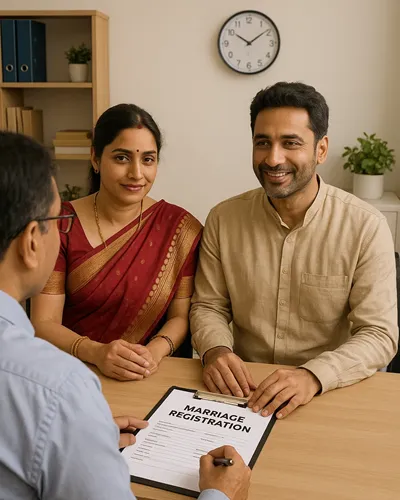
Legal Basis & Key Principles
- The Hindu Marriage Act, 1955 covers Hindus, Buddhists, Jains, Sikhs.
- The Special Marriage Act, 1954 allows civil/interfaith marriages without religious ceremonies.
- In Seema v. Ashwani Kumar (2006), the Supreme Court directed that all marriages (of Indian citizens) should be made compulsorily registerable in their respective States.
- However, registration alone doesn't validate a Hindu marriage if rituals under Section 7 (like saptapadi) were not performed. The Supreme Court recently held that mere registration without rituals cannot confer marital status.
Procedure & Requirements
| Step | Hindu Marriage Act | Special Marriage Act |
|---|---|---|
| Notice / waiting | None | 30 days public notice (to receive objections) |
| Ceremony requirement | Must have valid Hindu rites (Section 7) | Not required; civil solemnisation suffices |
| Registration office | Local marriage/sub-registrar (within jurisdiction) | Marriage Registrar of district where either partner resides |
| Presence on registration | Both spouses + witnesses must appear | Same requirement |
| Timeline | May be same day (if no objections / formalities) | After 30 days + objection handling |
| Certificate issuance | Once registration is done | After completion of formalities and no valid objections |
Documents Required
- Proof of age (birth certificate, school certificate, passport)
- Proof of residence/address (Aadhaar, voter ID, passport, utility bills)
- Passport-size photos of both spouses
- Proof of marriage (invitation, wedding photos)
- Witnesses' identity proofs (usually 2 or 3 witnesses)
- Affidavit/declaration (as per state rules)
- If previously married: divorce decree/death certificate of former spouse
Fees & Examples (State-wise / Localized)
- In many states, Hindu Marriage registration costs ~ ₹100
- For Special Marriage registration, typical fee ~ ₹150
Maharashtra:
- Special Marriage registration: ₹100
- Solemnization at Registrar's Office: ₹150
- Solemnization at other venue: ₹1,000
- Certificate: ₹25
Delhi:
- Under Hindu Marriage Act: ₹100
- Under Special Marriage Act: ₹150
Jaipur (Rajasthan): ~ ₹500–1,500 depending on Act & local rules.
State Comparison: Marriage Registration Rules & Fees
| State | Key Rules / Highlights | Fee & Time Estimates | Notes/Special Provisions |
|---|---|---|---|
| Delhi | Registration via office of Deputy Commissioner. Either spouse can apply in their jurisdiction. | • Under Hindu / religious marriage: ~ ₹100 (application fee) • Special Marriage Act: ~ ₹150 in many cases • Solemnization fee: ₹150 under Delhi's registrar's system. |
Witnesses needed. Affidavits etc. Some "Tatkal" schemes may be available though not uniformly under all Acts. |
| Maharashtra | Both Hindu Marriage Act & Special Marriage Act apply. Registration via Marriage Registrar. Special Marriage Act solemnization venue options vary. | • Application fee under SMA: ~ ₹100 • Solemnization at Registrar Office: ₹150 • Solemnization at other venue: ₹1,000 • Marriage Certificate issuance: ₹25 • Certificate timeline: marriage certificate ~ 15 days under SMA routes in Maharashtra when solemnized at Registrar Office and notice filed. |
If the venue is outside Registrar Office, fees are higher. Some 'fast-track' or weekend registrations being introduced in larger cities (e.g. Mumbai) with extra charges. |
| Uttarakhand | Uniform Civil Code (UCC) in force since Jan 27, 2025. Registration mandatory for marriages solemnized since March 26, 2010. Delay penalties apply. | • Registration fee under UCC: ₹250 normally. • Fee waivers granted till certain date: no registration fee till July 26, 2025; later extended till Jan 26, 2026 in many cases. • CSC centres charge ₹50 (including GST) for service, even during the exemption period. • Penalty for non-registration: upto ₹20,000. |
Must register within 60 days of the ceremony. Marriages before UCC implementation but after 2010 need to be registered within 6 months. Late registration/false documentation attracts fines. Special camps/digital assistance being provided. |
FAQs
-
1. Is marriage registration compulsory in India?
-
Yes. The Supreme Court has ordered that all marriages must be made registerable by states.
-
2. Does registration alone make a valid Hindu marriage?
-
No. Under Hindu Marriage Act, the marriage must be solemnised with proper rituals (Section 7). Registration is proof only when due ceremonies have been performed.
-
3. Can I register a marriage without a ceremony?
-
Under the Special Marriage Act, yes—religious rituals are not mandatory.
-
4. Can I register many years after the wedding?
-
Yes, registration can be done anytime later, provided documents and witnesses are available.
-
5. How many witnesses are required?
-
Generally 2 or 3 adult witnesses with valid ID proofs.
-
6. Do both spouses need to be present?
-
Yes, at the time of registration both must appear (unless special dispensation by registrar).
-
7. Can marriages done in one city be registered in another city?
-
Yes, if one spouse has residency / address proof in that jurisdiction.
-
8. Is same-sex marriage registration allowed?
-
Currently, Indian law does not recognize same-sex marriages under the HMA or the Special Marriage Act.
-
9. What is the waiting period under the Special Marriage Act?
-
30 days (for objections) from the date of notice.
-
10. Can NRI marriages be registered?
-
Yes, if one spouse has valid Indian address and requirements under the Act are met.
-
11. What happens if registration is not done?
-
Marriage remains legally valid (if rituals done) but evidence in legal, immigration, property, insurance cases becomes difficult.
-
12. Is the Indian marriage certificate valid abroad?
-
Yes. For many countries, you may require apostille or embassy attestation.
-
13. Do parents need to attend registration?
-
No, if both spouses are adults (18+ bride, 21+ groom).
-
14. Can registration be done online?
-
In many states yes—application, uploading documents, then physical verification.
-
15. How long does registration take?
-
Under Hindu Marriage Act: often same day or few days if no objections
Under Special Marriage Act: after 30 days + handling objections
Add new comment